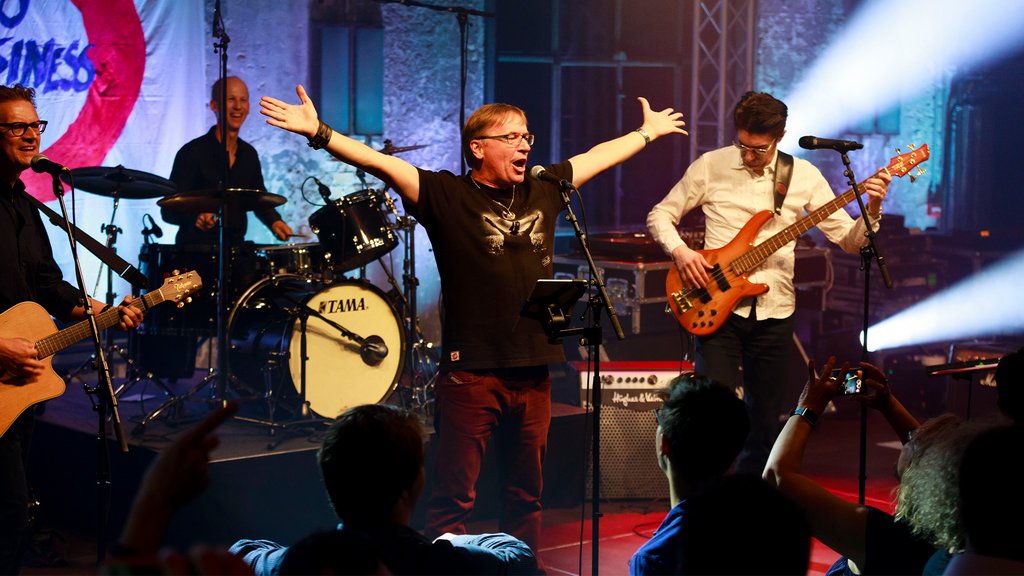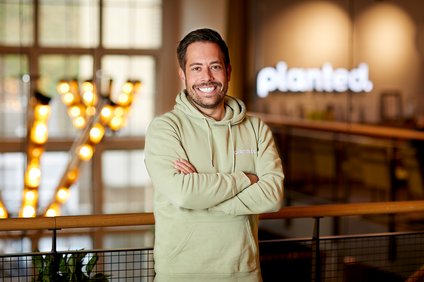People - 23.07.2021 - 00:00
Stanzas, jingles and songs set the rhythm
Professor Kuno Schedler runs the Institute for Systemic Management and Public Governance at the HSG. The business economist conducts research in the public administration of the future under the heading of Smart Government and analyses control systems in the boardroom. In his spare time, rhythmical verses set the tone: during St.Gallen’s carnival, Kuno Schedler tours the city’s watering holes as part of the satirical Schnitzelbank ditty duo Gallyriker; as a songwriter, he gives his thoughts artistic expression.

23 July 2021.
“Six hundred and twelve, in the woods with the bears
In the Steinach ravine, all alone.
I enjoy my peace, at the end of the world
And I feel quite simply at home.”
This is a stanza from the song entitled “Gallus” by the Ed Blue and The Rootstocks band. Country sounds accompany the story, which is rendered in broadest St.Gallen dialect. The arrival of the monk Gallus is sung of differently from the way it is generally known: Gallus feels a thirst for beer and sets up the first brewery in the settlement on the Steinach river. Ed Blue is the pseudonym of professor and management researcher Kuno Schedler. Just like Gallus, this ur-St.Galler feels “quite simply at home” here.
Professorial band founded at the piano bar
Unlike this version of the Gallus story, the foundation of the HSG’s first professorial band was not fuelled by beer. At a faculty weekend about 20 years ago, five professors met, all of whom made music. They started to improvise. One of them sat down at the piano, another got hold of a guitar, and Kuno Schedler took on the part of the singer. “Let’s form a band”: this was how “No Business” was born, a quintet of five rocking HSG professors.
Music is in the family
At home with his wife and two children, someone is always making music or writing song texts. His 18-year-old daughter Joya Marleen is a successful singer-songwriter, and his 19-year-old son Maurus mixes house beats under the name of Cody Heroes. The family members provide each other with feedback about their musical activities: “The rule is: if you want to hear my opinion, you’ll get an honest answer.” As a teenager, Schedler dreamt of becoming a professional musician. As a 17-year-old, he even appeared twice as a supporting act for Gianna Nannini. Looking back, he is aware of why his musical career came to nothing: “I was simply too bad,” says Kuno Schedler with a smile.
“Corona time was bleak”
Uuliidig – the local dialect term for “morose” – is what Schedler says he was during times of corona. No travelling, no concerts, no exchange with students: “Nothing happened.” He did not experience that time as one of deceleration, for the workload was high despite corona. Furthermore, Kuno Schedler also planned a new album with his country band Ed Blue and The Rootstocks; since the recordings were made abroad, production was delayed. The Schnitzelbank performance with his “Gallyriker” duo, which had been part of St.Gallen’s carnival for more than 20 years, also came to nothing: “St.Gallen with no carnival – a tragedy,” says Schedler.
Universal artist as a role model
The figurative mark, the HSG’s green/white symbol, “is based on the well-known picture of a man by Leonardo da Vinci and symbolises a dynamic, open-minded human being who thinks and acts in an integrative manner.” This is stated on the HSG’s website. But how does the University encourage an integrative education in a performance-oriented educational system? Kuno Schedler admits that performance pressure is a threat to integrative education and creativity, particularly in the Assessment Year at the Bachelor’s Level. However, the University also reinforces the so-called soft factors: with mentoring programmes, contextual studies and integration seminars, where students and staff break out of the purely disciplinary mould.
Knowledge cannot be measured
Good science is creative and social, says Schedler: creative in that it asks its own questions, social in that it makes a contribution to the knowledge in a society. However, the creative and social qualities suffer from the economic competition between universities: “People try to make measurable something non-physical such as knowledge.” In a spirit of self-criticism, the professor admits that the HSG with its management theory is not blameless for this economic competition. According to Schedler, a science that returns to dealing more intensively with contents “will require courageous leadership bodies which place more weight on content-related criteria than on purely formal ones. Science is intended to generate valuable knowledge, forge ahead with innovations and thus make a social contribution.”
Looking out of the window
At present, Kuno Schedler is conducting research on multirational management. He investigates how different perspectives influence each other and how fruitful interaction becomes possible. Besides the economic, academic, legal and social rationalities, there is also a creative rationality. This stands for the intrinsic motivation to venture something off one’s own bat even if there is a possibility of failure. With the motto “Come on, do it!”, executives can motivate their staff to dare to do something new – because they like and are interested in it rather than pursuing any economic purpose.
Kuno Schedler’s wish for students is that they should not exclusively concentrate on facts in order to list them in their CVs later. He suggests that they should gaze out of the window more often, for only people who give their thoughts free rein from time to time will come up with creative questions and ideas.
Text: Sabrina Rohner
Image: HSG Alumni
More articles from the same category
Discover our special topics











